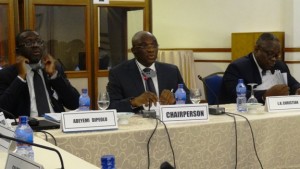Better governance, equity in sharing of resources identified as ways to end conflict in Africa
 African leaders have identified better governance, better equity in sharing of resources, dialogue and commitment to political and economic regional integration, as cardinal ways to prevent conflict in the Great Lakes, the Horn and the Sahel sub-regions.
African leaders have identified better governance, better equity in sharing of resources, dialogue and commitment to political and economic regional integration, as cardinal ways to prevent conflict in the Great Lakes, the Horn and the Sahel sub-regions.
Decentralisation and broader participation in decision making, creation of people-centred security systems by developing capacity for wealth creation, were also among solutions identified by over 40 African leaders and diplomats who convened for dialogue on conflict in Accra on Saturday, October 3.
The Capacity Development Division of the Economic Commission for Africa (ECA) convened the dialogue for in-depth discussions on three reports that examine the triggers and possible solutions to conflict in the Great Lakes, the Horn of Africa and the Sahel sub-regions.
A statement from the Economic Commission for Africa copied to ghanabusinessnews.com said the dialogue was expected to generate recommendations to guide governments in the regions concerned, the African Union and other key regional organisations, in designing comprehensive strategies and policy responses.
According to estimates from various studies, the death toll from recent wars in the Great Lakes area stood at over 5.4 million at April 2007.
The sub-region is estimated to have lost about 18.29 per cent of its collective GDP between 1990 and 2010 due to conflict.
It is also estimated that the area could save between $31 billion and $53 billion of GDP within just one year of putting an end to conflicts.
Opening the dialogue, Ghana’s Minister for the Interior Mr Mark Woyongo is reported to have admonished on the need for presentation of the bare facts on conflict and also commended the leadership of the African Union Commission (AUC) and the ECA for deciding to probe the causes and impact of conflict, for progress and prosperity.
“Without doubt, given our colonial history and inherent diversities in Africa, any nation state which practises politics of exclusion by which enough avenues are not provided for all the different segments of the population to credibly ventilate their political differences, whilst forging ahead with common values for nation building, is bound to find itself in conflicts that may rage on perpetually”, Mr Woyongo is cited saying in the statement.
Some causes of the complex and varied causes of conflict identified were historical grievances rooted in the arbitrary geopolitical demarcation of country boundaries without consideration of pre-existing ethnic configurations, economic factors especially the struggle over resources and food, and ineffective leadership and weak state institutions that have led to the contestation of the legitimacy of some central governments.
The struggle by outside powers to have a foothold on resources of countries that slip into conflict, corruption, unemployment, economic and political marginalization of youth, and the stifling of competitive democracy were also marked as antecedents of conflict in the three regions.
By Emmanuel Odonkor
